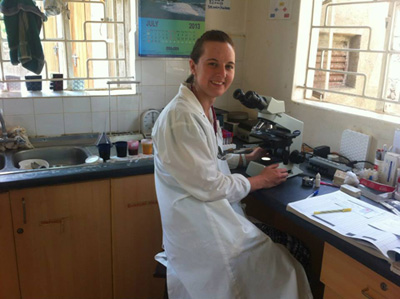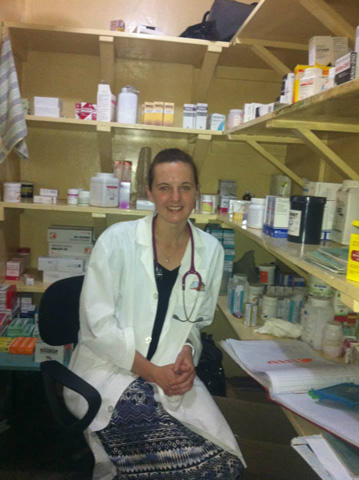
I had an amazing experience working in JOY hospice and learned a lot. The small hospice where I was based was in a rural part of the country and had 10 inpatient beds and an outpatients clinic which was open to patients all of the time. Although it officially focuses on end-of-life care, it accepts any patient who is sick and so most of the time there were only 2 or 3 palliative patients in the ward and the rest ranged from children with malaria, victims of accidents and adults with chronic health conditions such as congestive cardiac failure. The centre was fairly well equipped for a developing country and had its own small laboratory and pharmacy.
On an average day I worked for 10 hours starting at 7am with the ward round. Here I was able to assist by talking to the patients, examining them and suggesting the most appropriate treatment or management for the problem. Although few of the patients spoke English, the nurses were brilliant and were very willing to interpret for me when necessary. In the afternoons I saw outpatients and organised tests and treatment for them. Due to the fact that the patients had very little money as they rely heavily on subsistence agriculture and the fact that every test requested had a charge (apart from testing for malaria which the government reimbursed), I was forced to pay more attention to the history and clinical signs when making a diagnosis rather than relying on blood tests or scans and I believe this will benefit me and my patients in the future.
The majority of patients that I saw were only presenting to the healthcare centre because the traditional healer in the villages had either been unable to help or had actually made the situation worse. Many were very wary of western medicine and were unwilling to accept the advice given because of cultural and religious beliefs. This made me increasingly aware of the value of taking time with people and telling them exactly how medication works and what I would expect to happen as a way of making people feel comfortable and therefore increase compliance rather than just giving them some tablets and expecting them to take them.

This experience gave me an opportunity to observe how health care is organised and gave me a new appreciation of the NHS where regardless of financial status, people receive the care that they need. I also now greatly appreciate many aspects of care which we in the UK take for granted such as the provision of food in hospitals and the ambulance service. Many of the patients that I saw had walked for several hours to reach the clinic. One child who presented very weak with confirmed malaria had a Hb level of 2.4g/dL however because the clinic did not have the facilities to transfuse blood there was very little that could be done. In this circumstance the child could probably have done much better if a vehicle was available to allow quicker access to an appropriate facility. This was very hard to accept but made me recognise how incredibly privileged we are to be able to phone and be taken quickly to hospital by trained professionals.
In rural Africa there is also a focus on the community and family life compared to the individualistic focus in the West and this also had an effect of the healthcare system. Very often families had to make the difficult decision about whether they should spend money on treating their relatives or whether more value would be gained from paying for the children's school fees or investing in crops. These kind of situations gave me an even greater appreciation of having a health service in the UK that is free at the point of use.
Uganda is a developing nation which is plagued with many health problems. I think that I will definitely be a better doctor when I graduate from medical school because of this experience. It was very educational to learn about new conditions which are very rare in this country and it was inspirational to see how the doctors and healthcare team are able to care for their patients with such limited resources. It was very humbling to see how generous the people were and, despite having nothing, were willing to share their food and homes with me. It was a challenge to me to live more like they do – relying on God's provision from one day to the next






























